译林版(2019) 选择性必修第一册 Unit 2 The Universal Language Extended Reading Beethoven课件 (26张ppt)
文档属性
| 名称 | 译林版(2019) 选择性必修第一册 Unit 2 The Universal Language Extended Reading Beethoven课件 (26张ppt) | 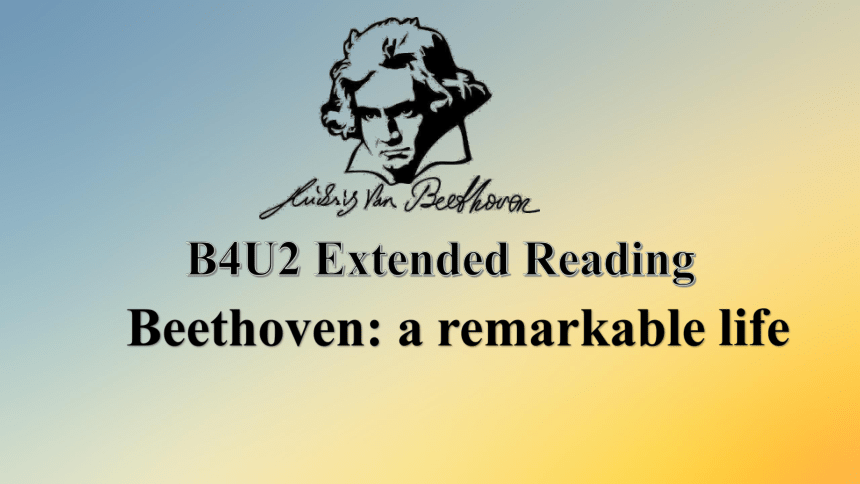 | |
| 格式 | pptx | ||
| 文件大小 | 28.5MB | ||
| 资源类型 | 教案 | ||
| 版本资源 | 牛津译林版(2019) | ||
| 科目 | 英语 | ||
| 更新时间 | 2023-02-17 15:03:38 | ||
图片预览

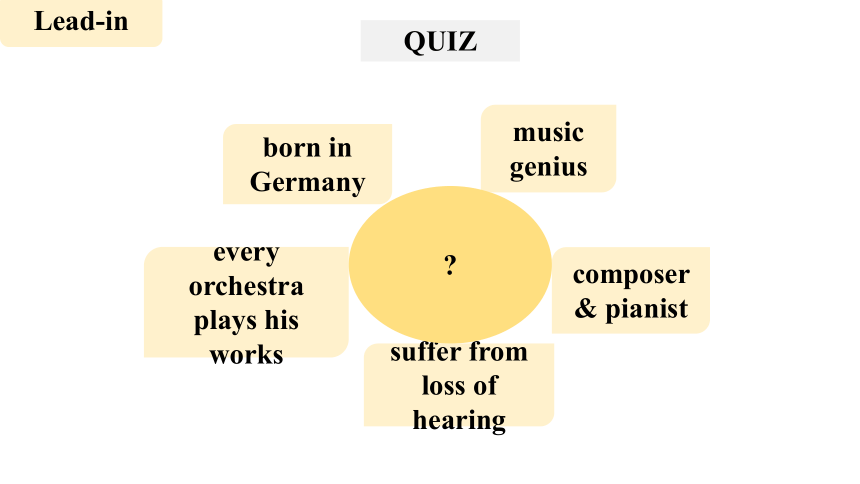
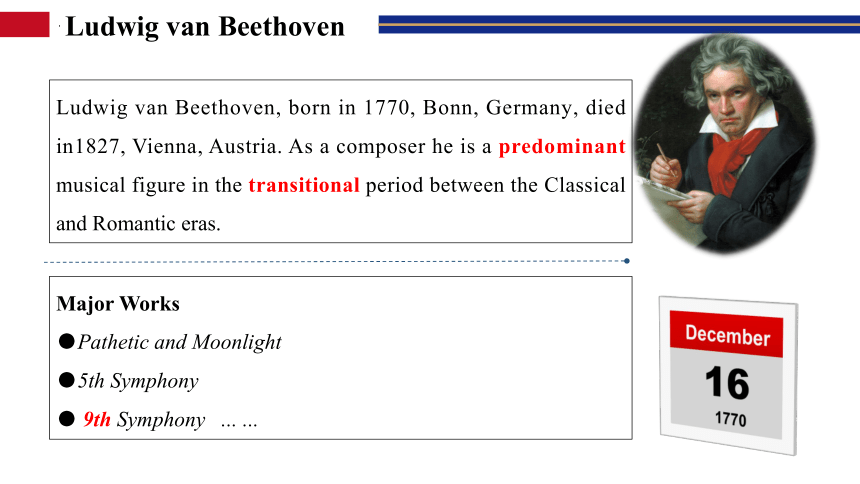
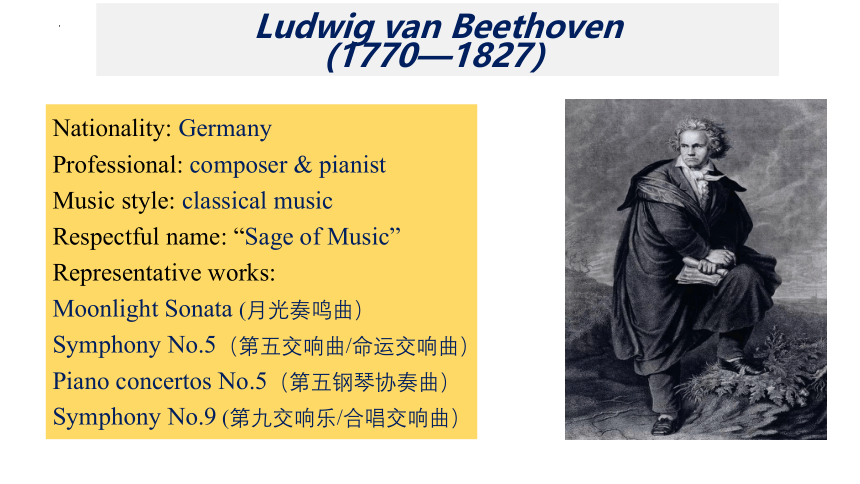
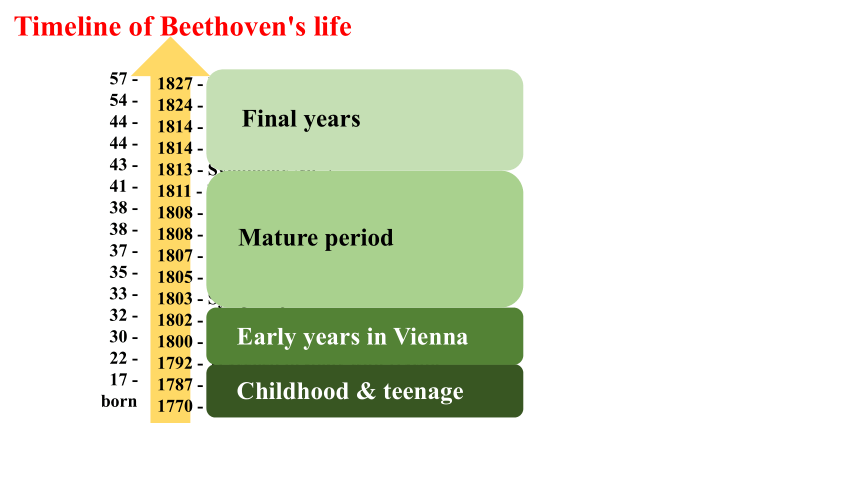
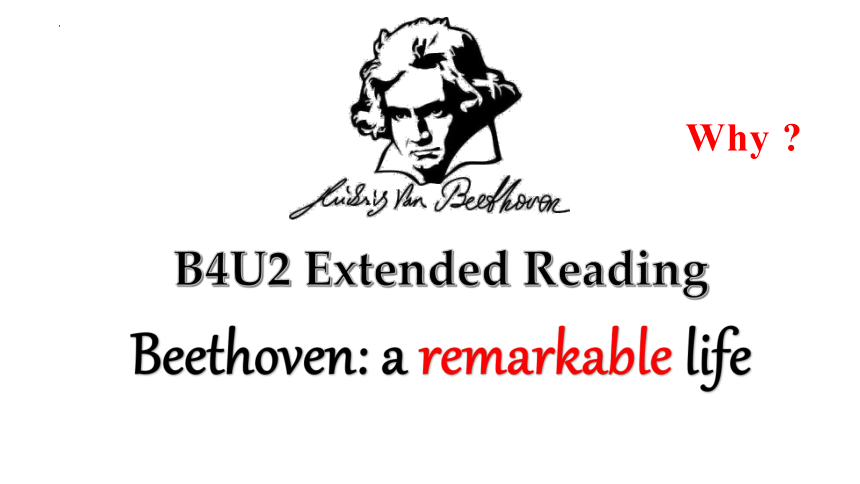
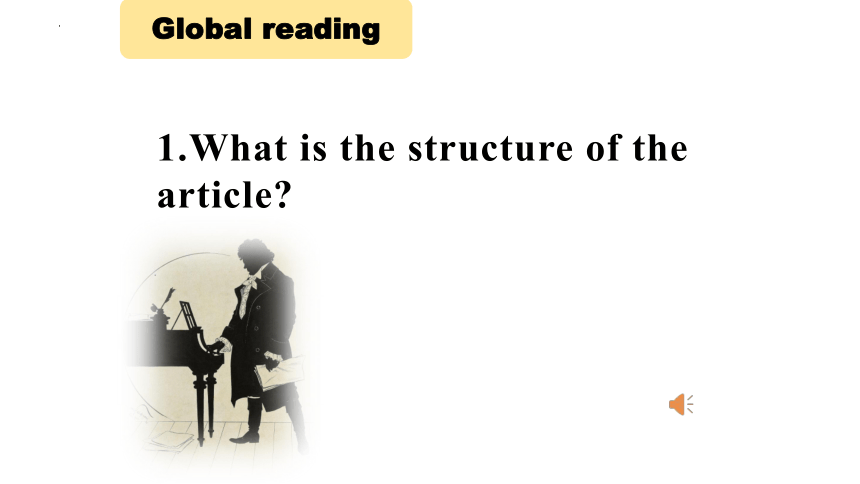
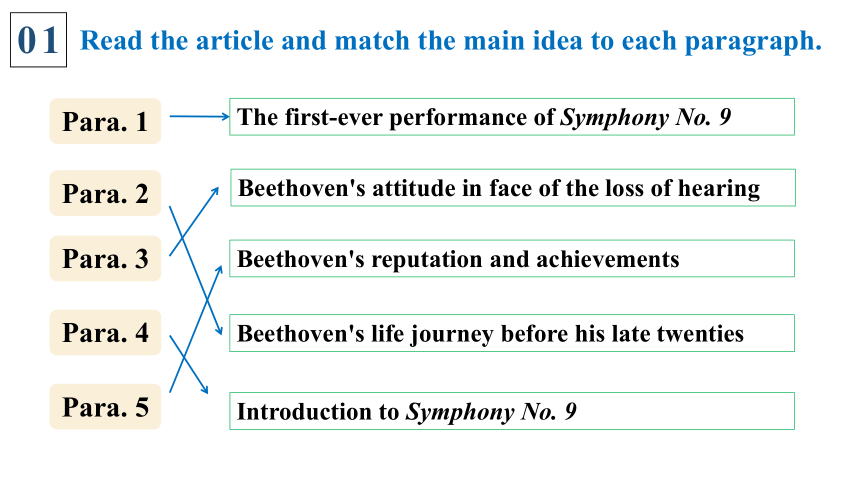
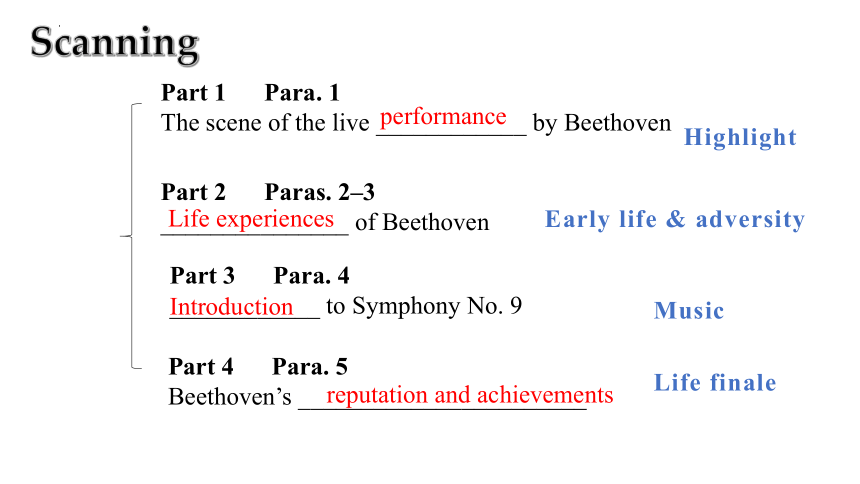
文档简介
(共25张PPT)
Beethoven: a remarkable life
B4U2 Extended Reading
born in Germany
every orchestra plays his works
composer & pianist
music genius
suffer from loss of hearing
Lead-in
QUIZ
生年月
Ludwig van Beethoven
Ludwig van Beethoven, born in 1770, Bonn, Germany, died in1827, Vienna, Austria. As a composer he is a predominant musical figure in the transitional period between the Classical and Romantic eras.
Major Works
●Pathetic and Moonlight
●5th Symphony
● 9th Symphony ... ...
Ludwig van Beethoven
(1770—1827)
Nationality: Germany
Professional: composer & pianist
Music style: classical music
Respectful name: “Sage of Music”
Representative works:
Moonlight Sonata (月光奏鸣曲)
Symphony No.5(第五交响曲/命运交响曲)
Piano concertos No.5(第五钢琴协奏曲)
Symphony No.9 (第九交响乐/合唱交响曲)
1827 - Beethoven's death
1824 - Symphony No. 9
1814 - Third and last version of Fidelio
1814 - Symphony No. 8
1813 - Symphony No. 7
1811 - Last public performance
1808 - Symphony No. 6
1808 - Symphony No. 5
1807 - Symphony No. 4
1805 - Symphony No. 3
1803 - Symphony No. 2
1802 - Depression
1800 - Symphony No.1
1792 - Travelled to study with Haydn
1787 - Travelled to Vienna to study with Mozart
1770 - Beethoven was born
Timeline of Beethoven's life
57 -
54 -
44 -
44 -
43 -
41 -
38 -
38 -
37 -
35 -
33 -
32 -
30 -
22 -
17 -
born
Childhood & teenage
Early years in Vienna
Final years
Mature period
Beethoven: a remarkable life
B4U2 Extended Reading
Why
Global reading
1.What is the structure of the article
Read the article and match the main idea to each paragraph.
0 1
Para. 1
The first-ever performance of Symphony No. 9
Para. 2
Beethoven's attitude in face of the loss of hearing
Para. 3
Para. 4
Para. 5
Beethoven's reputation and achievements
Beethoven's life journey before his late twenties
Introduction to Symphony No. 9
Part 1 Para. 1
The scene of the live ____________ by Beethoven
Part 2 Paras. 2–3
_______________ of Beethoven
Part 3 Para. 4
____________ to Symphony No. 9
Part 4 Para. 5
Beethoven’s _______________________
Introduction
reputation and achievements
Scanning
performance
Life experiences
Highlight
Early life & adversity
Music
Life finale
Para. 1 Beethoven’s first performance
Read for details
1. What was the audience’s response to Beethoven’s live performance
2. How do you think Beethoven felt seeing the audience’s response
· broke into enthusiastic cheers
· standing, clapping,
waving their hats
and handkerchiefs
astonished, admired, moved,
respectful
calm
content
comfortable
Paras. 2-3 Beethoven’s early life and suffering
This part is organized in the order of _____. How do you find that
time
As a gifted
child
Not long after
As a teenager
In late twenties
studying music
day and night
being appreciated for his piano performances
suffering the worst possible twist: gradual loss of hearing
enjoying a reputation as a wonderful young musician
Read for details
Paras. 2-3 Beethoven’s early life and suffering
How did Beethoven feel at the loss of hearing
Did he give in
How did he struggle against fate
use a variety of hearing aids to increase the amount of sound he could take in
When composing music at the piano, he would put one end of a pencil in his mouth and place the other end against the instrument so that he could feel the notes.
eg.
depressed, upset
Read for details
Bone conduction
硕士阶段
科研
Language points
1. … how could I possibly admit a weakness in the one sense 【which should be more perfect in me than in others】, a sense 【which I once possessed in the greatest perfection】 …
定语从句
定语从句
……这样一种在我身上本应比别人更加完美的感官,这样一种我曾经拥有绝顶禀赋的感官,如今怎能让我承认它有了缺陷……
硕士阶段
科研
Language points
2. When composing music at the piano, he would put one end of a pencil in his mouth and place the other end against the instrument so that he could feel the notes.
目的状语从句
连词+V-ing结构,相当于when he composed...
When reading the novel, the boy became so absorbed that he didn't notice the teacher came near.
那男孩读小说时太专心了,没有注意到老师走了过来。
Para. 4 Beethoven’s Symphony No.9
Read for details
The first movement
The next two movements
The fourth movement
Starts _______, but all of a sudden the whole orchestra breaks into an ________ theme.
Full of _________ lows and ________ highs.
All of the different variations are connected into a ______ chorus.
optimism
suffering&the strong will to fight suffering
determination
quietly
energetic
desperate
uplifting
joyful
Read for details
Para. 5 Beethoven’s achievements
Beethoven is regarded as one of the most remarkable musicians for his ______________________ and for his __________________ _________________.
amazing achievements
determination even
in his darkest days
Why is Beethoven regarded as one of the most remarkable musicians in history
Critical thinking
On 7 May 1824, a crowd of music lovers streamed into a theatre in Vienna to hear ... Beethoven’s Symphony No. 9 (Para. 1)
Symphony No. 9 was Beethoven’s last major piece of music in ... (Para. 2)
When Beethoven presented Symphony No. 9 in Vienna in 1824, it was his first time ... (Para. 3)
Since that day, Beethoven’s Symphony No. 9 has become one of the most famous and treasured pieces ... (Para. 4)
As Beethoven’s last great work, his Symphony No. 9 was also a grand finale to his life ... (Para. 5)
Symphony No. 9
1.What the use of Symphony No.9 in this article
string
⑤
③
①
④
②
Symphony No. 9
Why does the author choose
Symphony No. 9 as the string of the whole passage
●last major piece of music
●one of the most famous pieces in the history of classical music
●showing Beethoven’s genius
●indicating twists and turns of the musician’s life and reflecting his strong will
Beethoven: a remarkable life
Discussion
diligence
talent
optimism
determination
persistence
What do you think makes a great musician
passion
0 3
How does the author introduce the topic
The author introduces the topic by using flashback. The author chooses one of the most important moments in Beethoven’s career to introduce the topic.
flashback
In some texts, the events are not put exactly in time order; instead, an event that happened earlier is put in the middle of the main story, which is called flashback.
There is usually a transitional sentence indicating the change.
Para. 1
Para. 2
Para. 3
Para. 4
Appreciation
Flashback
Life and work
Para. 5
Highlight
To arouse interest
To create twists
To avoid stereotype
...
我要扼住命运的喉咙,它将无法使我完全屈服。——路德维希·凡·贝多芬
THANK YOU
Beethoven: a remarkable life
B4U2 Extended Reading
born in Germany
every orchestra plays his works
composer & pianist
music genius
suffer from loss of hearing
Lead-in
QUIZ
生年月
Ludwig van Beethoven
Ludwig van Beethoven, born in 1770, Bonn, Germany, died in1827, Vienna, Austria. As a composer he is a predominant musical figure in the transitional period between the Classical and Romantic eras.
Major Works
●Pathetic and Moonlight
●5th Symphony
● 9th Symphony ... ...
Ludwig van Beethoven
(1770—1827)
Nationality: Germany
Professional: composer & pianist
Music style: classical music
Respectful name: “Sage of Music”
Representative works:
Moonlight Sonata (月光奏鸣曲)
Symphony No.5(第五交响曲/命运交响曲)
Piano concertos No.5(第五钢琴协奏曲)
Symphony No.9 (第九交响乐/合唱交响曲)
1827 - Beethoven's death
1824 - Symphony No. 9
1814 - Third and last version of Fidelio
1814 - Symphony No. 8
1813 - Symphony No. 7
1811 - Last public performance
1808 - Symphony No. 6
1808 - Symphony No. 5
1807 - Symphony No. 4
1805 - Symphony No. 3
1803 - Symphony No. 2
1802 - Depression
1800 - Symphony No.1
1792 - Travelled to study with Haydn
1787 - Travelled to Vienna to study with Mozart
1770 - Beethoven was born
Timeline of Beethoven's life
57 -
54 -
44 -
44 -
43 -
41 -
38 -
38 -
37 -
35 -
33 -
32 -
30 -
22 -
17 -
born
Childhood & teenage
Early years in Vienna
Final years
Mature period
Beethoven: a remarkable life
B4U2 Extended Reading
Why
Global reading
1.What is the structure of the article
Read the article and match the main idea to each paragraph.
0 1
Para. 1
The first-ever performance of Symphony No. 9
Para. 2
Beethoven's attitude in face of the loss of hearing
Para. 3
Para. 4
Para. 5
Beethoven's reputation and achievements
Beethoven's life journey before his late twenties
Introduction to Symphony No. 9
Part 1 Para. 1
The scene of the live ____________ by Beethoven
Part 2 Paras. 2–3
_______________ of Beethoven
Part 3 Para. 4
____________ to Symphony No. 9
Part 4 Para. 5
Beethoven’s _______________________
Introduction
reputation and achievements
Scanning
performance
Life experiences
Highlight
Early life & adversity
Music
Life finale
Para. 1 Beethoven’s first performance
Read for details
1. What was the audience’s response to Beethoven’s live performance
2. How do you think Beethoven felt seeing the audience’s response
· broke into enthusiastic cheers
· standing, clapping,
waving their hats
and handkerchiefs
astonished, admired, moved,
respectful
calm
content
comfortable
Paras. 2-3 Beethoven’s early life and suffering
This part is organized in the order of _____. How do you find that
time
As a gifted
child
Not long after
As a teenager
In late twenties
studying music
day and night
being appreciated for his piano performances
suffering the worst possible twist: gradual loss of hearing
enjoying a reputation as a wonderful young musician
Read for details
Paras. 2-3 Beethoven’s early life and suffering
How did Beethoven feel at the loss of hearing
Did he give in
How did he struggle against fate
use a variety of hearing aids to increase the amount of sound he could take in
When composing music at the piano, he would put one end of a pencil in his mouth and place the other end against the instrument so that he could feel the notes.
eg.
depressed, upset
Read for details
Bone conduction
硕士阶段
科研
Language points
1. … how could I possibly admit a weakness in the one sense 【which should be more perfect in me than in others】, a sense 【which I once possessed in the greatest perfection】 …
定语从句
定语从句
……这样一种在我身上本应比别人更加完美的感官,这样一种我曾经拥有绝顶禀赋的感官,如今怎能让我承认它有了缺陷……
硕士阶段
科研
Language points
2. When composing music at the piano, he would put one end of a pencil in his mouth and place the other end against the instrument so that he could feel the notes.
目的状语从句
连词+V-ing结构,相当于when he composed...
When reading the novel, the boy became so absorbed that he didn't notice the teacher came near.
那男孩读小说时太专心了,没有注意到老师走了过来。
Para. 4 Beethoven’s Symphony No.9
Read for details
The first movement
The next two movements
The fourth movement
Starts _______, but all of a sudden the whole orchestra breaks into an ________ theme.
Full of _________ lows and ________ highs.
All of the different variations are connected into a ______ chorus.
optimism
suffering&the strong will to fight suffering
determination
quietly
energetic
desperate
uplifting
joyful
Read for details
Para. 5 Beethoven’s achievements
Beethoven is regarded as one of the most remarkable musicians for his ______________________ and for his __________________ _________________.
amazing achievements
determination even
in his darkest days
Why is Beethoven regarded as one of the most remarkable musicians in history
Critical thinking
On 7 May 1824, a crowd of music lovers streamed into a theatre in Vienna to hear ... Beethoven’s Symphony No. 9 (Para. 1)
Symphony No. 9 was Beethoven’s last major piece of music in ... (Para. 2)
When Beethoven presented Symphony No. 9 in Vienna in 1824, it was his first time ... (Para. 3)
Since that day, Beethoven’s Symphony No. 9 has become one of the most famous and treasured pieces ... (Para. 4)
As Beethoven’s last great work, his Symphony No. 9 was also a grand finale to his life ... (Para. 5)
Symphony No. 9
1.What the use of Symphony No.9 in this article
string
⑤
③
①
④
②
Symphony No. 9
Why does the author choose
Symphony No. 9 as the string of the whole passage
●last major piece of music
●one of the most famous pieces in the history of classical music
●showing Beethoven’s genius
●indicating twists and turns of the musician’s life and reflecting his strong will
Beethoven: a remarkable life
Discussion
diligence
talent
optimism
determination
persistence
What do you think makes a great musician
passion
0 3
How does the author introduce the topic
The author introduces the topic by using flashback. The author chooses one of the most important moments in Beethoven’s career to introduce the topic.
flashback
In some texts, the events are not put exactly in time order; instead, an event that happened earlier is put in the middle of the main story, which is called flashback.
There is usually a transitional sentence indicating the change.
Para. 1
Para. 2
Para. 3
Para. 4
Appreciation
Flashback
Life and work
Para. 5
Highlight
To arouse interest
To create twists
To avoid stereotype
...
我要扼住命运的喉咙,它将无法使我完全屈服。——路德维希·凡·贝多芬
THANK YOU
同课章节目录
- Unit 1 Food matters
- Welcome to the unit
- Reading
- Grammar and usage
- Integrated skills
- Extended reading
- Project
- Unit 2 The Universal Language
- Welcome to the unit
- Reading
- Grammar and usage
- Integrated skills
- Extended reading
- Project
- Unit 3 The art of painting
- Welcome to the unit
- Reading
- Grammar and usage
- Integrated skills
- Extended reading
- Project
- Unit 4 Exploring poetry
- Welcome to the unit
- Reading
- Grammar and usage
- Integrated skills
- Extended reading
- Project
